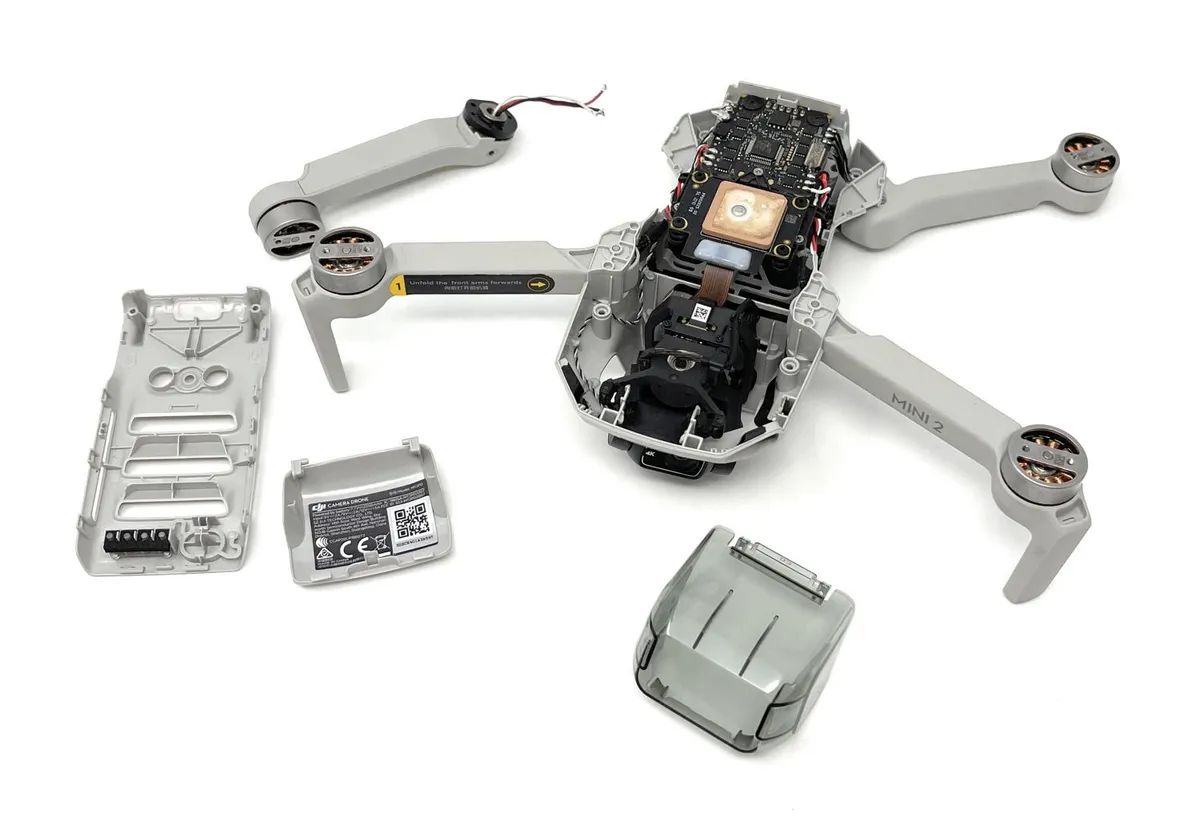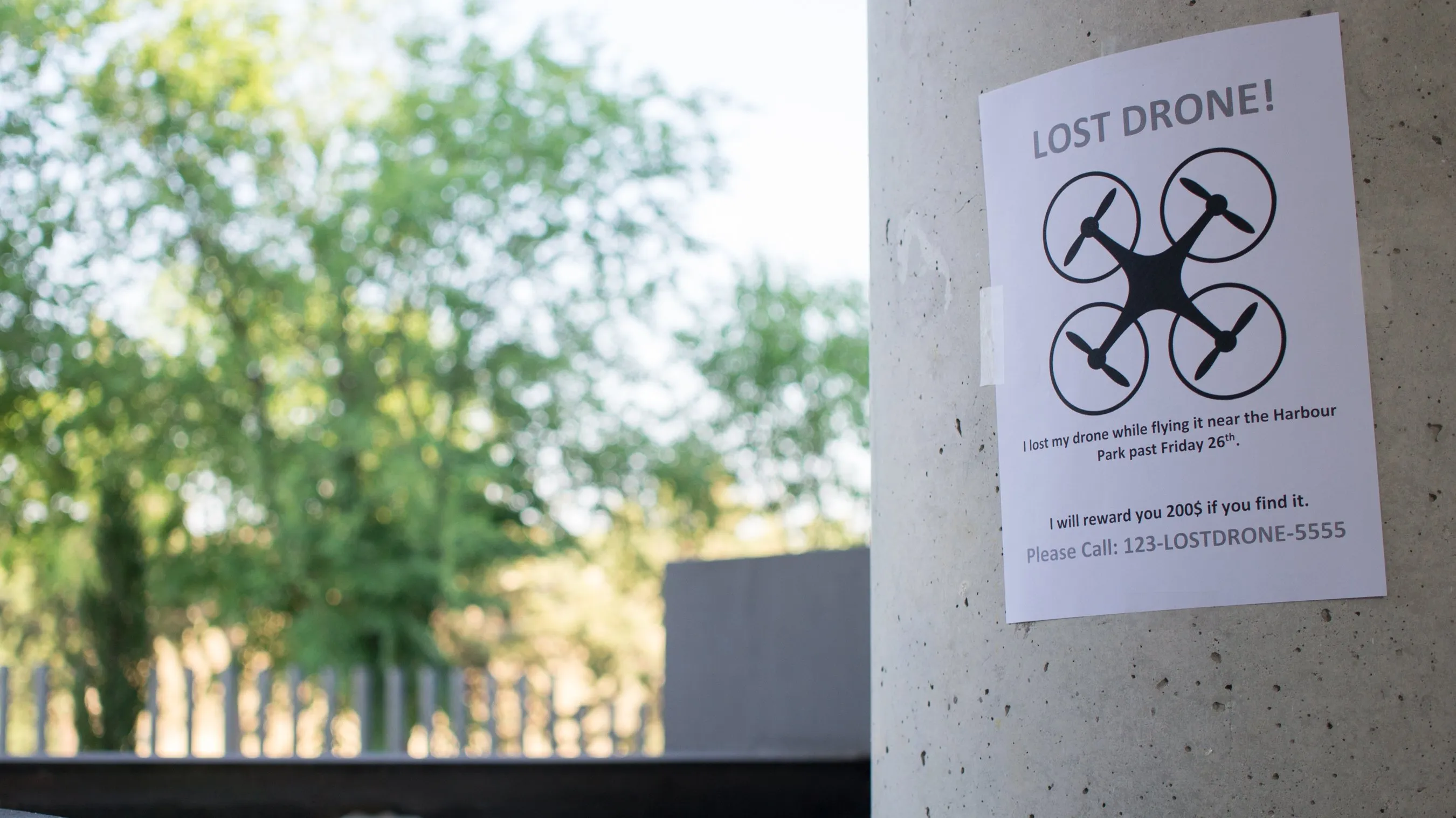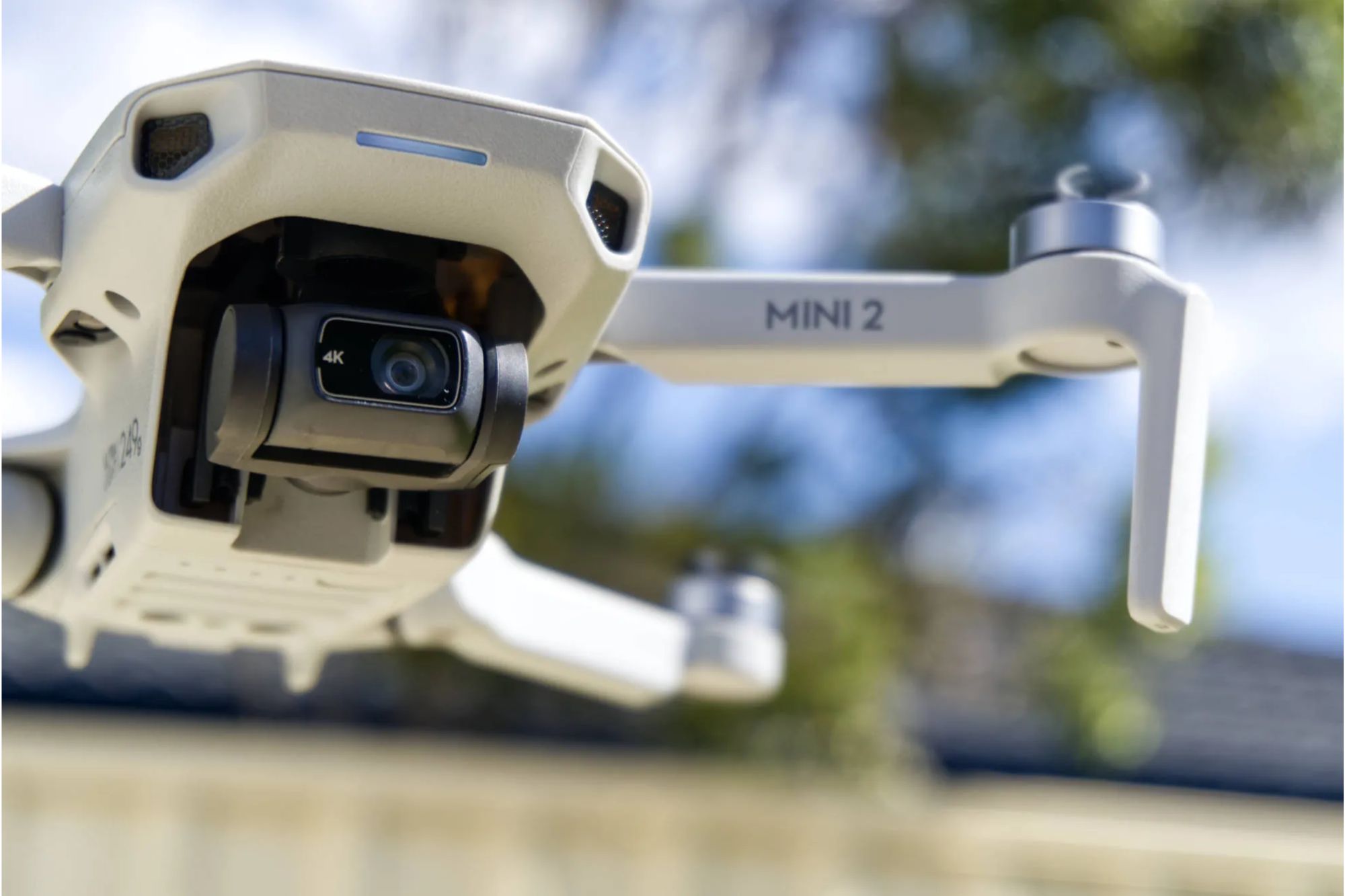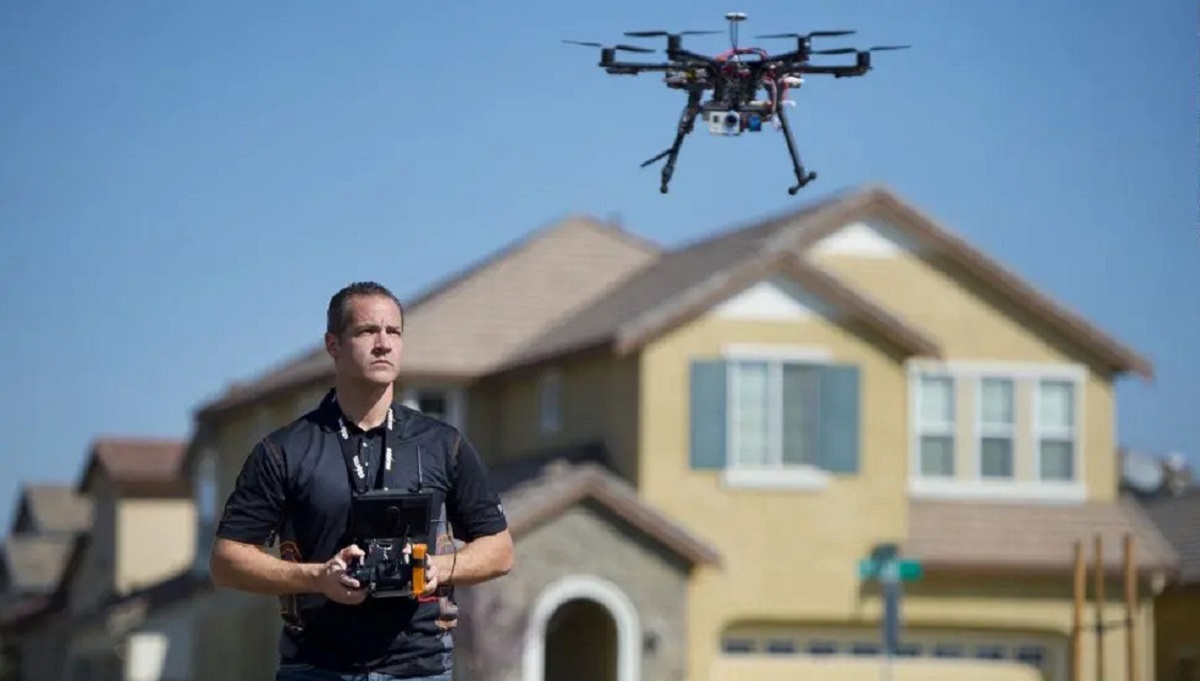Introduction
Welcome to the exciting world of drones! These unmanned aerial vehicles have gained immense popularity in recent years, captivating both hobbyists and professionals alike. However, along with the joy of flying comes the responsibility of adhering to regulations and guidelines set by authorities.
One crucial aspect of being a drone owner is the requirement to register your drone with the appropriate governing body. Drone registration serves as a vital tool in promoting safety, accountability, and responsible drone operation. In this article, we will explore the basics of drone registration, the legal requirements involved, and the consequences that may arise if you fail to register your drone.
Drone registration involves providing relevant information about your drone, such as its make, model, and serial number, along with your contact details. This information is then recorded in a database, which aids authorities in identifying and tracing drones in case of any incidents or violations. The registration process is relatively simple and can usually be completed online through the designated registration portal.
Before delving into the potential consequences of not registering your drone, it is essential to understand the legal framework surrounding drone registration. The specific regulations may vary depending on your country or region, so it is crucial to familiarize yourself with the laws and requirements specific to your area.
By not registering your drone, you risk running afoul of the law and facing severe penalties. Authorities have the means to detect unregistered drones through various methods, including on-ground inspections, aerial surveillance, and reports by other drone operators or concerned citizens.
The Basics of Drone Registration
Drone registration is a straightforward process that involves providing key information about your drone and yourself as the owner. This information is then recorded in a database maintained by the governing body responsible for drone regulation in your country or region.
When registering your drone, you will typically need to provide details such as the make, model, and serial number of your drone. In addition, you will be required to provide your personal contact information, including your name, address, and phone number. Some registration processes may also require you to upload a photo or proof of purchase for your drone.
It’s important to note that drone registration is not a one-time activity. In many cases, your drone registration will have an expiration date, and you will need to renew it periodically. This ensures that the information on file remains accurate and up-to-date.
The purpose of drone registration is twofold. Firstly, it allows authorities to keep track of the growing number of drones being operated in their jurisdiction, enabling them to identify and trace drones if necessary. This serves as a valuable tool in maintaining safety and security in airspace.
Secondly, drone registration promotes accountability among drone owners. By having your drone registered, you are acknowledging your responsibility to operate your drone safely and in accordance with the rules and regulations set by the governing body.
It’s worth noting that some countries have specific requirements for different categories of drones. For example, recreational drones may have different registration requirements compared to drones used for commercial purposes. Familiarize yourself with the regulations that apply to your specific drone category to ensure compliance.
Several countries have designated online portals or systems specifically designed for drone registration. These platforms often provide clear instructions and guidelines to help you navigate through the registration process seamlessly. Be sure to follow the instructions carefully and provide accurate information to ensure a successful registration.
By taking the time to register your drone, you are not only fulfilling a legal requirement but also contributing to the safe and responsible operation of drones in your area. Understanding the basics of drone registration is the first step toward becoming a responsible drone owner and operator.
Legal Requirements for Drone Registration
Drone registration is a legal obligation in many countries around the world. The specific requirements for drone registration may vary depending on your country or region. To ensure compliance, it is essential to familiarize yourself with the legal framework and regulations governing drone registration in your area.
In general, the legal requirements for drone registration include providing accurate information about your drone and yourself as the owner. This typically includes details such as the make, model, and serial number of your drone, as well as your personal contact information.
It’s important to note that there may be age restrictions for drone registration. Some countries require the drone owner/operator to be of a certain age, often 18 years or older. This is to ensure that drones are operated responsibly and safely.
In addition to providing accurate information, you may also be required to pay a registration fee. The registration fee helps cover the costs associated with maintaining the registration database and enforcing drone regulations.
Drone registration requirements may also differ based on the purpose of drone use. For example, recreational drone operators may have different registration requirements compared to those using drones for commercial purposes. Commercial drone operators may need to obtain additional licenses or permits in addition to registering their drones.
Some countries have specific regulations when it comes to flying drones above a certain weight. Drones that exceed a certain weight threshold may require additional registration or permits. It is crucial to be aware of these weight restrictions and comply with them to ensure you meet all legal requirements.
Failure to comply with the legal requirements for drone registration can result in serious consequences. Authorities have the means to detect unregistered drones through various methods, including aerial surveillance and reports from other drone operators or concerned citizens.
By adhering to the legal requirements for drone registration, you not only avoid potential penalties but also contribute to the overall safety and regulation of drone operations within your area. It is your responsibility as a drone owner and operator to stay informed about the legal obligations and requirements involved in operating your drone.
Consequences of Not Registering a Drone
Failing to register your drone can have significant consequences, both legally and practically. It is essential to understand the potential ramifications of not completing the necessary drone registration process.
One of the primary legal consequences of not registering your drone is the risk of facing fines and penalties. Many countries have specific laws in place that mandate the registration of drones within a certain weight range. Failure to comply with these regulations can result in hefty fines, ranging from moderate to severe, depending on the jurisdiction and the severity of the violation.
In addition to monetary fines, the unregistered drone can also be confiscated by authorities. Dealing with the loss of an expensive piece of equipment can be frustrating and financially burdensome. Not to mention, there is a chance that the confiscated drone may not be returned, further compounding the consequences.
Operating an unregistered drone also exposes you to potential legal liabilities. If your drone causes damage to property or injures someone while in flight, lacking proper registration may make it more difficult for you to prove that you were operating within regulatory guidelines. This can result in legal disputes and possible lawsuits, which can be both time-consuming and expensive.
Furthermore, unregistered drones may face restrictions on where they can be flown. Some countries or regions have designated no-fly zones or restricted airspace where only registered drones are allowed. If you fail to register your drone, you may inadvertently end up violating airspace regulations, risking further legal repercussions.
Practically speaking, not registering your drone can negatively impact the drone community as a whole. The responsible registration of drones helps authorities track and regulate drone usage to ensure safe operations. By refusing to register your drone, you contribute to the perception that drone operators are unwilling to comply with regulations, thereby damaging the reputation of the drone community.
Lastly, purchasing insurance for your drone can become complicated if it is not registered. Many insurance providers require proof of registration as a prerequisite for coverage. Operating an unregistered drone puts you at a significant disadvantage should you experience any damage, loss, or liability, as insurance coverage will likely be denied.
It is crucial to recognize that the consequences of not registering your drone go beyond legal penalties. Failing to complete the registration process can result in financial losses, legal liabilities, restricted access to airspace, and a tarnished reputation within the drone community. By registering your drone, you not only comply with legal requirements but also contribute to the overall safety and sustainability of the drone industry.
Fines and Penalties for Unregistered Drones
Operating an unregistered drone can lead to significant fines and penalties, as authorities take the registration process seriously in order to ensure the safety and accountability of drone operations. While the specific fines and penalties vary depending on the jurisdiction and the severity of the violation, it is important to understand the potential consequences of flying an unregistered drone.
In many countries, the penalties for not registering a drone can range from moderate to severe fines. The exact amount of the fine may depend on factors such as the country’s regulations, the weight of the drone, and the purpose of its use. It is not uncommon for fines to range from a few hundred dollars to several thousand dollars, especially for repeat offenders.
Additionally, some countries may impose a daily fine for each day that the drone remains unregistered. This adds up quickly and can result in substantial financial burdens for the drone owner. It is important to note that fines can be imposed not only for flying an unregistered drone but also for failing to provide accurate or up-to-date registration information.
In more severe cases, the authorities may confiscate the unregistered drone. Confiscation not only deprives the drone owner of their expensive equipment but can also result in the destruction or sale of the seized drone. This loss can significantly impact the drone owner’s financial investment and, in some cases, may be irreversible.
It is crucial to be aware that fines and penalties are not the only consequences of flying an unregistered drone. Operating without proper registration can also lead to legal liabilities if the drone causes damage to property or injures someone. Without proof of registration, it becomes more challenging to demonstrate compliance with regulations, making it harder to defend against potential legal claims or lawsuits.
Furthermore, as drones become more widely utilized for commercial and recreational purposes, the authorities are cracking down on non-compliance. They may employ various surveillance methods, including on-ground inspections and aerial monitoring, to detect unregistered drones. Reports from concerned citizens or other drone operators can also trigger investigations, leading to fines and penalties.
It is worth noting that the fines and penalties associated with unregistered drones are in place to encourage responsible drone ownership and operation. Registering your drone not only helps you avoid legal repercussions but also demonstrates your commitment to being a responsible drone operator and contributing to the safety and regulation of the drone community.
Risk of Losing Your Drone
Flying drones without proper registration poses the risk of losing your valuable equipment. Authorities have the power to confiscate unregistered drones, resulting in the loss of your drone and potentially significant financial consequences.
When an unregistered drone is confiscated, it may not be returned to you easily or at all. The process of reclaiming a confiscated drone can be time-consuming, requiring you to navigate through bureaucratic procedures and provide evidence of ownership and registration. In some cases, your drone may be sold or destroyed, leaving you with no recourse but to bear the loss.
Confiscation can occur during routine checks conducted by authorities to ensure compliance with drone registration requirements. These checks can take place at public events, parks, or other locations where drones are commonly flown. Unregistered drones stand out due to lack of visible registration markings or identification numbers, making them more likely to be targeted by enforcement agencies.
Additionally, if your unregistered drone causes any damage or poses a safety risk, it may be seized by the authorities as evidence. This is particularly true in cases where the drone has been involved in accidents, flown recklessly, or violated airspace regulations. Not only are you at risk of losing your drone, but you may also face legal repercussions and potential liability for damages.
It’s important to understand that losing your drone not only results in a financial loss but also deprives you of the joys and benefits of drone ownership. Losing your drone can be frustrating and disheartening, especially if it was a significant investment or held sentimental value.
To avoid the risk of losing your drone, it is crucial to prioritize drone registration. By registering your drone, you are complying with legal requirements and demonstrating your commitment to responsible drone operation. This minimizes the chances of confiscation and ensures that you can enjoy the full benefits of drone ownership without unnecessary setbacks.
By recognizing the risk of losing your drone and taking proactive steps to register it, you are safeguarding your investment and contributing to the overall safety and accountability of the drone community.
Negative Impact on the Drone Community
Failure to register your drone can have a negative impact not only on yourself but also on the entire drone community. Operating an unregistered drone undermines the efforts to promote responsible and safe drone operation, ultimately tarnishing the reputation of all drone enthusiasts.
When drone owners choose not to register their drones, it sends a message that they are unwilling to comply with regulations and operate within the established legal framework. This perception can harm the public’s perception of drones and those who operate them, creating a negative image of the entire drone community.
Non-compliance with registration requirements can result in careless drone operations and an increased risk of accidents or incidents. This not only endangers public safety but also contributes to a negative perception of drones as potential hazards rather than valuable tools and recreational devices.
Furthermore, unregistered drones may fly in restricted areas or no-fly zones, violating airspace regulations designed to protect critical infrastructure, public buildings, or areas where privacy is paramount. Such actions can lead to increased scrutiny and tighter regulations on all drone operations, affecting both recreational and commercial drone users.
Another negative impact arises from the lack of accountability associated with unregistered drones. In the event of a drone-related incident, such as damage to property, invasion of privacy, or injury to individuals, authorities may find it challenging to identify and locate the responsible drone owner without proper registration records.
Moreover, the lack of registration can hinder the ability to track down lost or stolen drones. If an unregistered drone is lost or stolen, the chances of recovery are significantly diminished. This not only results in monetary losses for the individual owner but also means that the stolen drone could potentially be used for illegal activities without any traceable ownership.
The negative impacts extend beyond legal and practical implications. They also affect the drone community’s collective reputation and standing in society. By not registering drones and complying with regulations, drone owners are not contributing to building a positive image of responsible drone operation.
It is essential for all drone operators to recognize the importance of registering their drones. By doing so, they demonstrate their commitment to safety, accountability, and responsible drone operation. Working together as a community, registered drone owners can help eliminate negative perceptions and promote the positive benefits that drones can bring to various industries and recreational pursuits.
Difficulties with Drone Insurance
Operating a drone without proper registration can create difficulties when it comes to obtaining drone insurance coverage. Many insurance providers require proof of registration as a prerequisite for coverage, making it challenging for owners of unregistered drones to secure insurance protection.
Drone insurance is essential for protecting yourself from potential liability, damage, loss, or theft associated with your drone. However, insurance providers view registered drones as a lower risk compared to unregistered ones. This is because registered drones have traceable ownership and are typically operated by individuals who have demonstrated their commitment to following regulations and operating responsibly.
Without proper registration, insurance providers may view your drone as a higher risk and impose higher premiums, exclude certain coverage options, or even decline coverage altogether. From their perspective, an unregistered drone represents a potential liability due to the lack of accountability and adherence to regulatory requirements.
Insurance coverage can be particularly crucial for commercial drone operators who use their drones for professional purposes. Lack of proper insurance coverage could expose them to significant financial risk in case of accidents, damage to property, or potential lawsuits from third parties.
Furthermore, some clients or organizations may require proof of insurance before granting permission to fly a drone or allowing drone operations on their property. Operating an unregistered drone makes it difficult to obtain the necessary coverage and can limit the opportunities for commercial drone operators to secure contracts and fulfill their obligations.
The difficulties with obtaining insurance for unregistered drones not only leave owners financially vulnerable but also hinder the wider adoption of drones for various applications. Without proper insurance coverage, the perception of drones being risky and untrustworthy may prevail, limiting the growth and acceptance of drone technology in industries such as aerial photography, videography, inspections, and deliveries.
By registering your drone and complying with regulations, you enhance your eligibility for insurance coverage. Registered drone owners demonstrate their commitment to responsible drone operation, making it easier to obtain insurance coverage at reasonable rates and ensuring the protection of their valuable equipment and the potential liabilities associated with drone use.
It is advisable to consult with insurance providers familiar with drone operations to understand their specific requirements and coverage options. By investing in appropriate drone insurance, you can mitigate potential financial risks and operate your drone with confidence and peace of mind.
Drone Registration and Safety
Drone registration plays a crucial role in promoting safety within the drone community. By registering your drone, you contribute to the overall safety of drone operations and help ensure responsible and accountable drone use.
One of the primary reasons for drone registration is the ability to trace and identify drones. In the event of an incident or violation, authorities can use the registration information to track down the owner and hold them accountable. This helps discourage reckless behavior and promotes responsible drone operation.
Registered drones are more likely to be operated by individuals who have made a commitment to follow regulations and guidelines. These individuals are often more aware of the potential risks and engage in safe flying practices, reducing the chances of accidents and incidents.
Registration also encourages drone operators to familiarize themselves with the rules and regulations specific to their jurisdiction. Understanding and adhering to these regulations promotes safe and responsible drone operation and helps prevent avoidable accidents.
By registering your drone, you become part of a network of responsible drone owners who are committed to adhering to safety protocols. This collective commitment to safety not only protects you and your drone but also contributes to the overall safety of the airspace shared by all drone operators.
Furthermore, drone registration allows authorities to distribute important safety information to drone owners. These may include updates on airspace restrictions, temporary flight restrictions due to events or emergencies, and guidelines for safe flying practices. Staying informed about these safety measures helps ensure that you are operating your drone in a responsible and compliant manner.
From a broader perspective, drone registration supports the integration of drones into the airspace system. As drone usage continues to increase, it is necessary to establish an infrastructure that accommodates both manned and unmanned aircraft safely. By registering your drone, you contribute to the data and information necessary for airspace management and the development of regulations to ensure the safe integration of drones.
Remember, drone registration is not just a legal requirement; it is a commitment to safety and responsible operations. By registering your drone, you affirm your dedication to promoting safety within the drone community, protecting public interests, and continuing the positive growth of the drone industry.
Conclusion
Drone registration is not just a legal obligation; it is a vital step in promoting safety, accountability, and responsible operation within the drone community. By registering your drone, you contribute to a safer and more regulated airspace for drone operations.
Understanding the basics of drone registration and the legal requirements involved is essential for all drone owners. While the specific regulations may vary depending on your country or region, the overall objective remains the same – to ensure the proper identification and traceability of drones.
Choosing not to register your drone can have significant consequences. Fines, penalties, and the risk of losing your drone are just a few of the potential outcomes of non-compliance. Additionally, operating an unregistered drone can damage the reputation of the drone community and hinder the wider adoption and acceptance of drones for various applications.
Registering your drone also plays a crucial role in obtaining drone insurance coverage and overcoming potential difficulties in securing insurance protection. By meeting the registration requirements, you demonstrate your commitment to responsible drone operations, which can help in obtaining insurance coverage at competitive rates.
Most importantly, drone registration contributes to safety. It enables authorities to trace and identify drones, hold operators accountable, and distribute important safety information. By registering your drone, you become part of a network of responsible operators who prioritize adherence to regulations and prioritize the safety of everyone in the airspace.
Whether you are a recreational drone enthusiast or a commercial drone operator, take the time to familiarize yourself with the drone registration requirements in your area. By doing so, you can ensure compliance, contribute to safety efforts, protect yourself from legal penalties and risks, and actively promote the responsible and positive growth of the drone community.

























